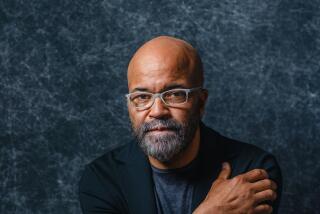The Mekons Mix Music Styles and Politics
- Share via
The Mekons are an unusual hybrid among rock bands: unabashedly intellectual in outlook, yet raucous and rollicking enough in musical approach to pass muster at a rowdy barn dance.
Formed in the punk-rock explosion of 1977, the 10-member British band’s suitability for a barn dance rests in its rough but engaging appropriation of rootsy styles, including traditional British folk, Cajun and Mexican music, country & Western, and now the reggae and Calypso that crop up for the first time on the band’s new album, “So Good It Hurts.”
The Mekons, who play Friday at Club Lingerie and Saturday at Bogart’s in Long Beach (minus three members left behind because the band can’t afford to tour with its full lineup), have displayed their bookish bent by annotating their two U.S. albums with serio-comic bibliographies and textual glosses. The references range from Balzac, Melville and Celine to James Watt (the former Reagan Cabinet member) and the horror film, “Omen III: The Final Conflict.”
The footnotes are partly for laughs, bassist Kevin Lycett, one of three original members still in the band, said in a phone interview. “But it’s also a reaction to middle-browness. I hate sloppy thinking and middlebrow ideas. We’re trying to show there can be much more going on in (an album) and in our ongoing body of work. The (footnotes and textual bits) are little, discreet signposts.”
Lyrically, the signs from the left-leaning Mekons have been bleak. Most of the band’s songs are political and social commentaries, and with conservative governments entrenched throughout the ‘80s in England and the United States, the Mekons haven’t seen much cause for cheer.
“The Edge of the World,” an import-only album that registered on many critics’ lists of the best albums of 1986, depicted characters groping about a contemporary wasteland. Last year’s U.S. debut, “Honky Tonkin’,” was in a similar vein. But if their outlook was pessimistic, even dejected, the Mekons held onto their sanity by keeping their sense of humor and taking some comfort and a shot of energy from the zestfulness and durability of the traditional musical styles in which they couched their laments.
Besides Lycett, the touring version of the Mekons includes the two other founding members, singer/guitarists Jon Langford and Tom Greenhalgh, singer Sally Timms, fiddler Susie Honeyman, keyboardist Robert Worby (who doubles as sound man) and drummer Steve Goulding, a veteran of Graham Parker’s old band, the Rumour. Among the Mekons left behind was Dick Taylor, an elder statesman of British rock who played in the embryonic lineup of the Rolling Stones and founded the Pretty Things.
Although still less than sanguine about the sociopolitical state of things, Lycett said, the Mekons decided to take a more hopeful tack on “So Good It Hurts.”
“We felt we were in danger of becoming hairshirt-tearing prophets in the wilderness, predicting doom and gloom. We very deliberately said, ‘We’re going to be much more positive on this album. We’re going to find positive examples, historical role models, of resistance fighting back.’ ”
Hence, the bright, Calypso-flavored “Robin Hood,” which posits the rustic hero of British lore as a model for righting economic injustices. Two concluding songs, the Buddy Holly-ish stomp, “Maverick,” and a bluegrass-fiddle workout, “Vengeance,” find the Mekons engaging in more affirmative broadsides against prevailing powers than they previously allowed themselves.
But unlike the Clash, whose songs endorsed particular movements like the Sandinistas, and Billy Bragg, the punk-influenced folk singer who doubles as a political activist for Britain’s Labor Party, the Mekons have been reluctant to advocate or enlist in any actual political program.
It’s a matter, Lycett said, of not seeing any program that the Mekons can endorse. Hence the deep sense of alienation that comes through in the Mekons’ music--in contrast to the Clash’s anthems and Bragg’s forthright polemics.
“I would love, and the rest of the band would love, to do something more (to effect change),” Lycett said. “To feel that there is nothing coherent and constructive with which you can work is extremely frustrating. But that happens to be the case.”
Which leaves the band with its craft: songs that take literate, unsentimentalized looks at how oppressive conditions are internalized.
“We’re very much for people thinking for themselves, not accepting what they’re told by anybody, whether it’s Billy Bragg or the Mekons,” Lycett said, summing up his band’s ethos. “We’re in favor of hard thinking and hard drinking.”
More to Read
The biggest entertainment stories
Get our big stories about Hollywood, film, television, music, arts, culture and more right in your inbox as soon as they publish.
You may occasionally receive promotional content from the Los Angeles Times.









